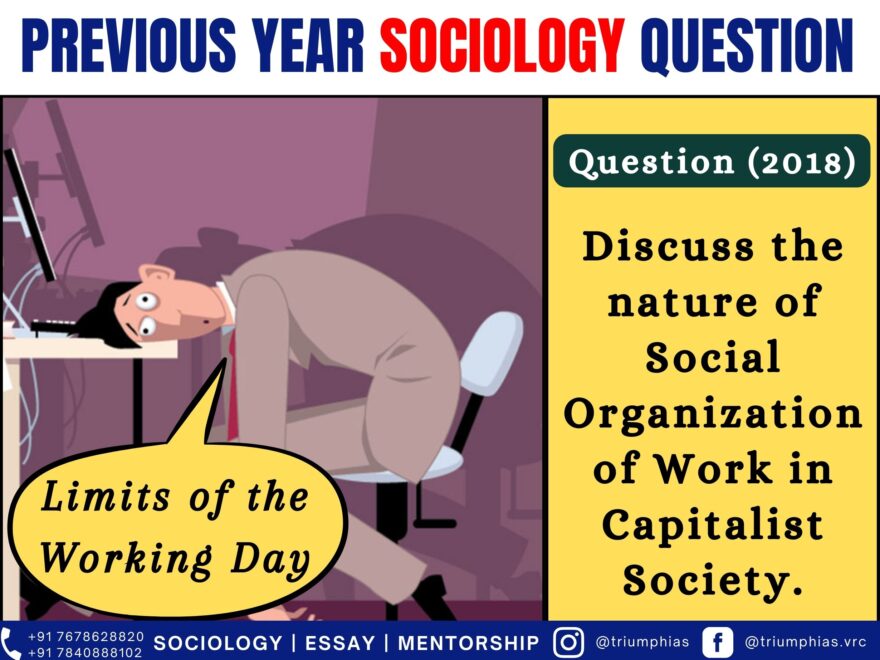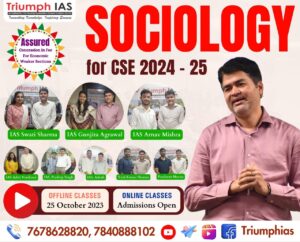Discuss the nature of social organization of work in capitalist society with reference to the Limits of the working day.
Section: B
Sociology Paper 2018.
Relevant for Sociology Optional for Civil Services Examination.
Paper 1: Unit-6 Work and Economic Life
Question: Discuss the nature of social organization of work in capitalist society with reference to the Limits of the working day.
– 10 Marks
Introduction: Brief About the Marxian Idea of Capitalism.Main Body: Details About the Limits of Working Day.Conclusion: Relevance of the Idea. |
Introduction:
- A key component of Marxist theory, labour exploitation emphasizes the disparity between the value created by workers and the wages they are paid. In capitalist society, the profit motive predominantly drives work, and the capitalists aim to extract maximum surplus value from the labour.
- A significant aspect to explore in this context is the limits of the working day, which manifests the inherent conflict between the capitalist’s desire for maximizing surplus value and the worker’s need for fair compensation and humane working hours.
Main Body:
- The capitalist system, rooted in Marx’s theory, predominantly functions on profit and surplus extraction. The working day’s length becomes a battlefield where the capitalist desires to maximize surplus labour beyond the necessary labour time.
- According to Marx, every worker is paid a wage that corresponds to the subsistence level, yet the value that the labour adds to the commodity is far greater than the wage paid. The excess value, or surplus value, generated becomes the profit pocketed by the capitalist.
- Taking an example into consideration, let’s explore the textile industry, particularly the case of garment workers in cities like Bangalore. A large number of women workers are employed in this sector. The owners or capitalists aim to derive maximum production output within minimal time frames.
- Often, these workers are required to work long hours, extending beyond the statutory limits, without proportional overtime wages. (National Labour Institute reports on Garment Industry in Bangalore).
- Despite the exhaustive working hours, their compensation does not reflect the true value of their labour contribution, indicating a high level of exploitation. In essence, the surplus value extracted by the capitalist is significant, while the workers remain at a subsistence level, highlighting the nature of work organization in a capitalist society.
- In the realms of legal and moral constraints, the working hours should ideally be limited, keeping in view the Worker’s Physical and Mental Well-Being. However, the capitalist motive primarily seeks to stretch these boundaries to optimize surplus extraction, often leading to conflicts and necessitating interventions from labour unions and legal institutions.
Conclusion:
The concept of the limits of the working day is crucial for safeguarding labour rights, promoting worker well-being, and maintaining a healthy work-life balance. It prevents exploitation, supports productivity, and is a fundamental principle in labour laws, contributing to economic stability and human rights.
Related Blogs …
| |
To master these intricacies and fare well in the Sociology Optional Syllabus, aspiring sociologists might benefit from guidance by the Best Sociology Optional Teacher and participation in the Best Sociology Optional Coaching. These avenues provide comprehensive assistance, ensuring a solid understanding of sociology’s diverse methodologies and techniques.
META TAGS:
Heritage Tourism, heritage tourism in india, heritage tourism upsc, Urban Development, Socio-Spatial Patterns, Cultural Exchange, Gentrification, Conservation, Regional Development, Cultural Identity, Over-urbanization, Inclusive Development, development of heritage tourism in india, India
Why Vikash Ranjan’s Classes for Sociology?
Proper guidance and assistance are required to learn the skill of interlinking current happenings with the conventional topics. VIKASH RANJAN SIR at TRIUMPH IAS guides students according to the Recent Trends of UPSC, making him the Best Sociology Teacher for Sociology Optional UPSC.
At Triumph IAS, the Best Sociology Optional Coaching platform, we not only provide the best study material and applied classes for Sociology for IAS but also conduct regular assignments and class tests to assess candidates’ writing skills and understanding of the subject.
Choose The Best Sociology Optional Teacher for IAS Preparation?
At the beginning of the journey for Civil Services Examination preparation, many students face a pivotal decision – selecting their optional subject. Questions such as “which optional subject is the best?” and “which optional subject is the most scoring?” frequently come to mind. Choosing the right optional subject, like choosing the best sociology optional teacher, is a subjective yet vital step that requires a thoughtful decision based on facts. A misstep in this crucial decision can indeed prove disastrous.
Ever since the exam pattern was revamped in 2013, the UPSC has eliminated the need for a second optional subject. Now, candidates have to choose only one optional subject for the UPSC Mains, which has two papers of 250 marks each. One of the compelling choices for many has been the sociology optional. However, it’s strongly advised to decide on your optional subject for mains well ahead of time to get sufficient time to complete the syllabus. After all, most students score similarly in General Studies Papers; it’s the score in the optional subject & essay that contributes significantly to the final selection.
“A sound strategy does not rely solely on the popular
Opinion of toppers or famous YouTubers cum teachers.”
It requires understanding one’s ability, interest, and the relevance of the subject, not just for the exam but also for life in general. Hence, when selecting the best sociology teacher, one must consider the usefulness of sociology optional coaching in General Studies, Essay, and Personality Test.
The choice of the optional subject should be based on objective criteria, such as the nature, scope, and size of the syllabus, uniformity and stability in the question pattern, relevance of the syllabic content in daily life in society, and the availability of study material and guidance. For example, choosing the best sociology optional coaching can ensure access to top-quality study materials and experienced teachers. Always remember, the approach of the UPSC optional subject differs from your academic studies of subjects. Therefore, before settling for sociology optional, you need to analyze the syllabus, previous years’ pattern, subject requirements (be it ideal, visionary, numerical, conceptual theoretical), and your comfort level with the subject.
This decision marks a critical point in your UPSC – CSE journey, potentially determining your success in a career in IAS/Civil Services. Therefore, it’s crucial to choose wisely, whether it’s the optional subject or the best sociology optional teacher. Always base your decision on accurate facts, and never let your emotional biases guide your choices. After all, the search for the best sociology optional coaching is about finding the perfect fit for your unique academic needs and aspirations.
Follow us:
🔎 https://www.instagram.com/triumphias
🔎https://www.youtube.com/c/TriumphIAS
🔎https://t.me/VikashRanjanSociology
Find More Blogs
| Compare and contrast Karl Marx’s and Max weber’s | Karl Marx- Historical Materialism |
| Talcott Parsons : Social system | Scope of the subject and comparison with other social sciences |


